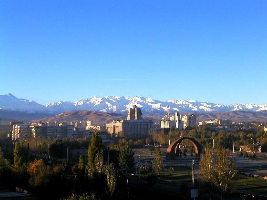Bishkek Hosts The 2013 SCO Summit
By Arslan Sabyrbekov (the 18/09/2013 issue of the CACI Analyst
On September 13, 2013, a summit of the Shanghai Cooperation Organization (SCO) took place in Bishkek, the capital of the Kyrgyzstan. The leaders of Russia, China, Tajikistan, Uzbekistan, Kazakhstan, Afghanistan, Iran and Mongolia, as well as delegations from India and Pakistan, both of which have observer status in the SCO, attended the summit and outlined their positions on a number of geopolitical issues. The joint positions of the participants were reflected in the so-called "Bishkek Declaration."
Traffic Accident Sparks Tensions between Kyrgyzstan and Uzbekistan
By Arslan Sabyrbekov (the 04/09/2013 issue of the CACI Analyst)
On August 26, 2013, the Kyrgyz Foreign Ministry sent a note of protest to official Tashkent regarding a traffic accident involving Uzbek high ranking diplomats that, according to the reports, led to a scuffle.
Girl Travel Ban Passed in Kyrgyzstan
by Aigul Kasymova (the 08/21/13 issue of the CACI Analyst)
On June 12, 2013, the Kyrgyz Parliament passed legislation restricting girls under the age of 22 from travelling abroad. In total, 59 MPs voted in favor of the legislation and 2 against it. Social Democratic Party MP Yrgal Kadyralieva was the initiator of the legislation. According to Kadyralieva, the legislation is designed to protect young Kyrgyz girls from becoming prostitutes and working in brothels abroad, a problem that has increased in recent years. The regulation restricting free movement of girls under the age of 22 resulted in a widespread public disapproval in the capital of Bishkek despite Kadyralieva’s intensions, as stated in various public appearances, to protect the so-called moral welfare of the Kyrgyz nation.
Should Kyrgyzstan Search for Investors at Home?
by Rafis Abazov and Talaibek Koichumanov (the 08/21/13 issue of the CACI Analyst)
The Kyrgyz government has announced new initiatives aiming to attract foreign direct investments (FDIs) into the Kyrgyz national economy. The country needs significant resources to deal with chronic mass unemployment – especially high among rural youth – as well as widespread poverty and an aging manufacturing infrastructure. Yet, the experience of some developing countries, such as Bangladesh, India and China, suggests that help might be much closer than politicians think: in the so-called Bamboo Capitalism, diaspora-sponsored business development. According to various estimates, the rapidly growing Kyrgyz diaspora and domestic Kyrgyz businesses keep between US$ 1 and US$ 3 billion in foreign accounts, properties, businesses and equities. Can Kyrgyzstan utilize this unique opportunity to revive its national economy?

Bishkek Court Rules to Release Three Opposition Lawmakers
by Arslan Sabyrbekov (the 08/07/2013 issue of the CACI Analyst)
On June 17, 2013, the second level court in Bishkek acquitted and released Kamchybek Tashiev, Sadyr Japarov and Talant Mamytov, three opposition lawmakers previously convicted of attempting to stage a coup d’état in the country.



